Affiliate links on Android Authority may earn us a commission. Learn more.
Samsung Galaxy Note 7 vs Galaxy Note 5
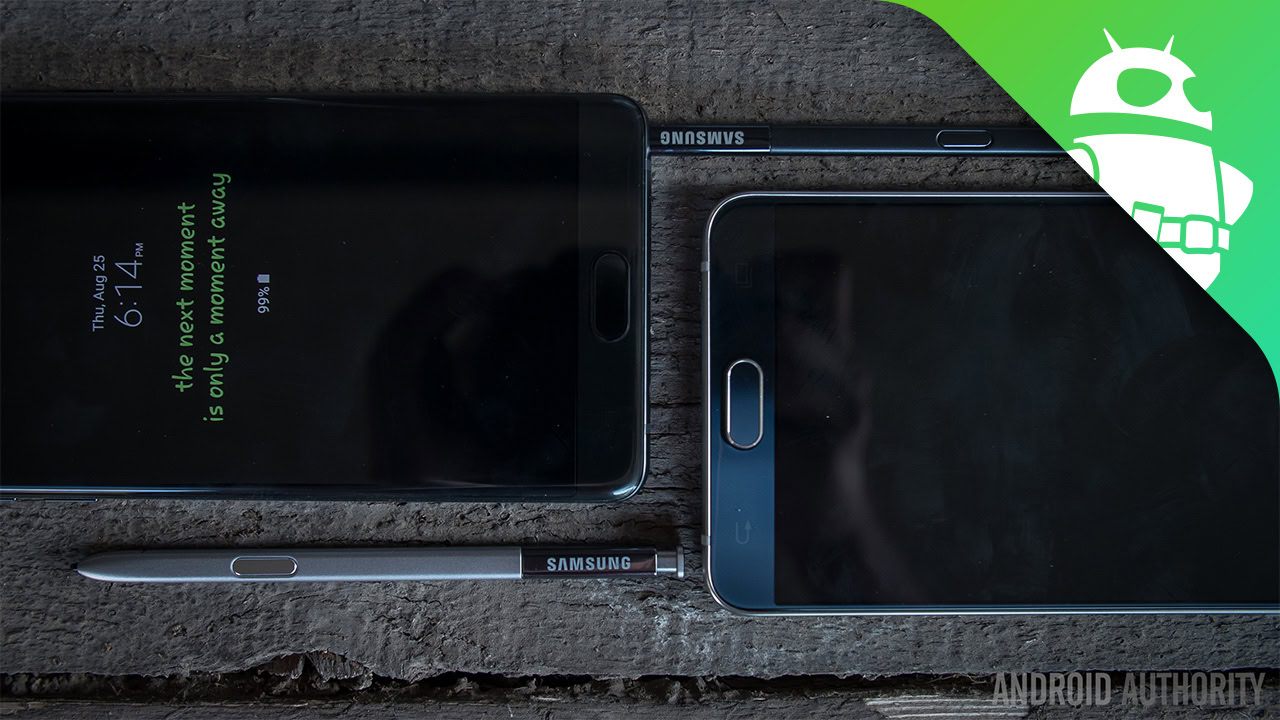
With the latest addition to the popular Galaxy Note series, Samsung decided to make the leap from 5 to 7. As is the case whenever a new generation of a device comes out, the question on everyone’s mind is whether it is a worthy upgrade.
[related_videos title=”Samsung Galaxy Note 7 videos” align=”center” type=”custom” videos=”714781,712423,710252,706889,706890,706790″]
In doing so, we can also revisit the 5th version of the Galaxy Note, and find if it is still a phone you can keep in your pocket, or save a little bit of money on, instead of the latest and greatest that Samsung has to offer. This is the Samsung Galaxy Note 7 vs the Galaxy Note 5.
Design
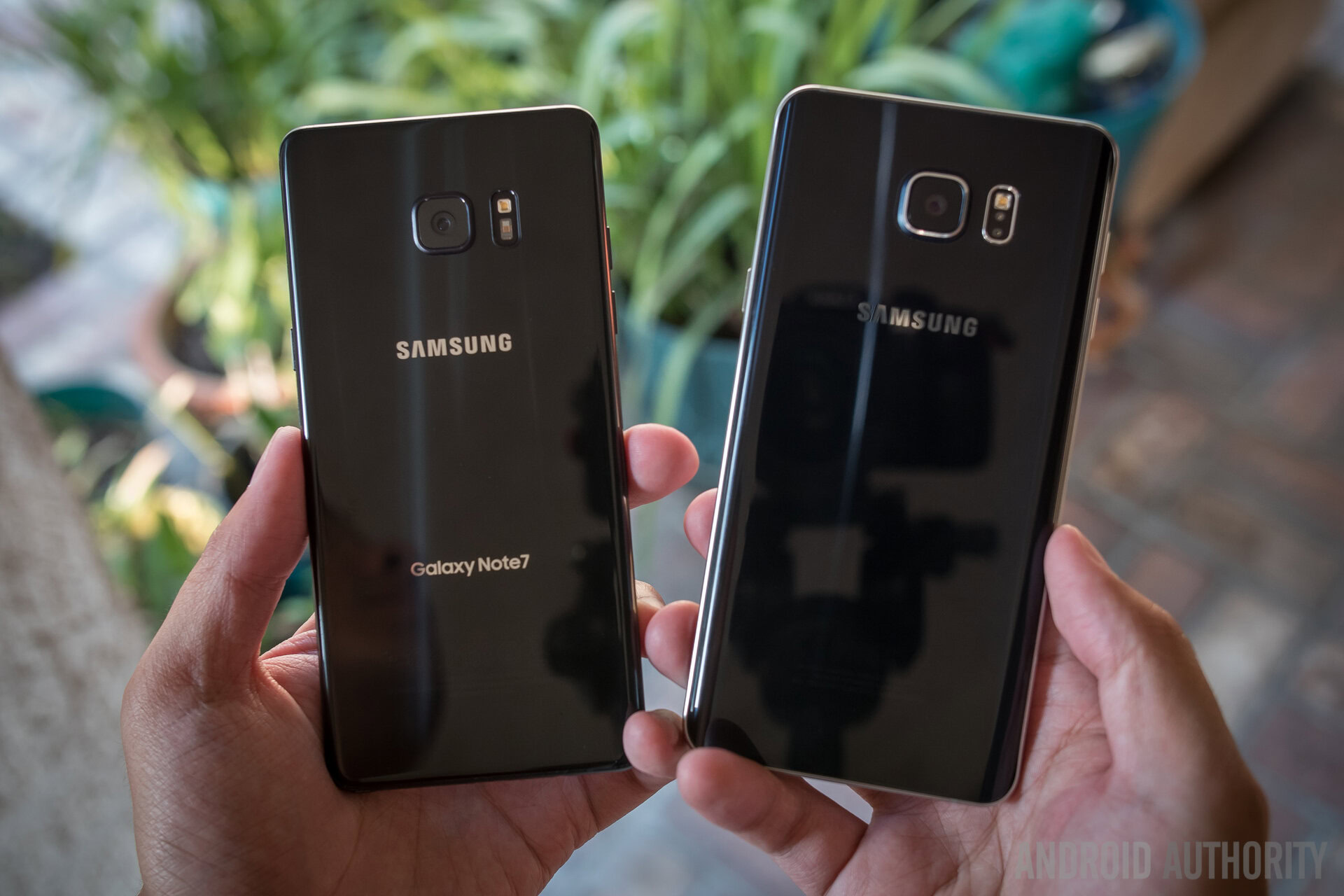
The glass and metal unibody construction that was introduced with the Galaxy S7 was not just an experiment, but rather the baseline for the design that Samsung was going to use going forward. This was made abundantly clear when the Galaxy Note 5 was released, even though plenty believed that having the Galaxy Note device taking the lead of the S line, and not the other way around, brought the former down a peg in importance.
One design aspect helped soften the blow, however, which was the curve on the back of the device that made it easier to hold. This curve, when on the front, was rather controversial with the Galaxy S6 Edge and its larger, S-Penless brother, but putting it on the back was a simple, but significant glimpse, into how it could help with handling.
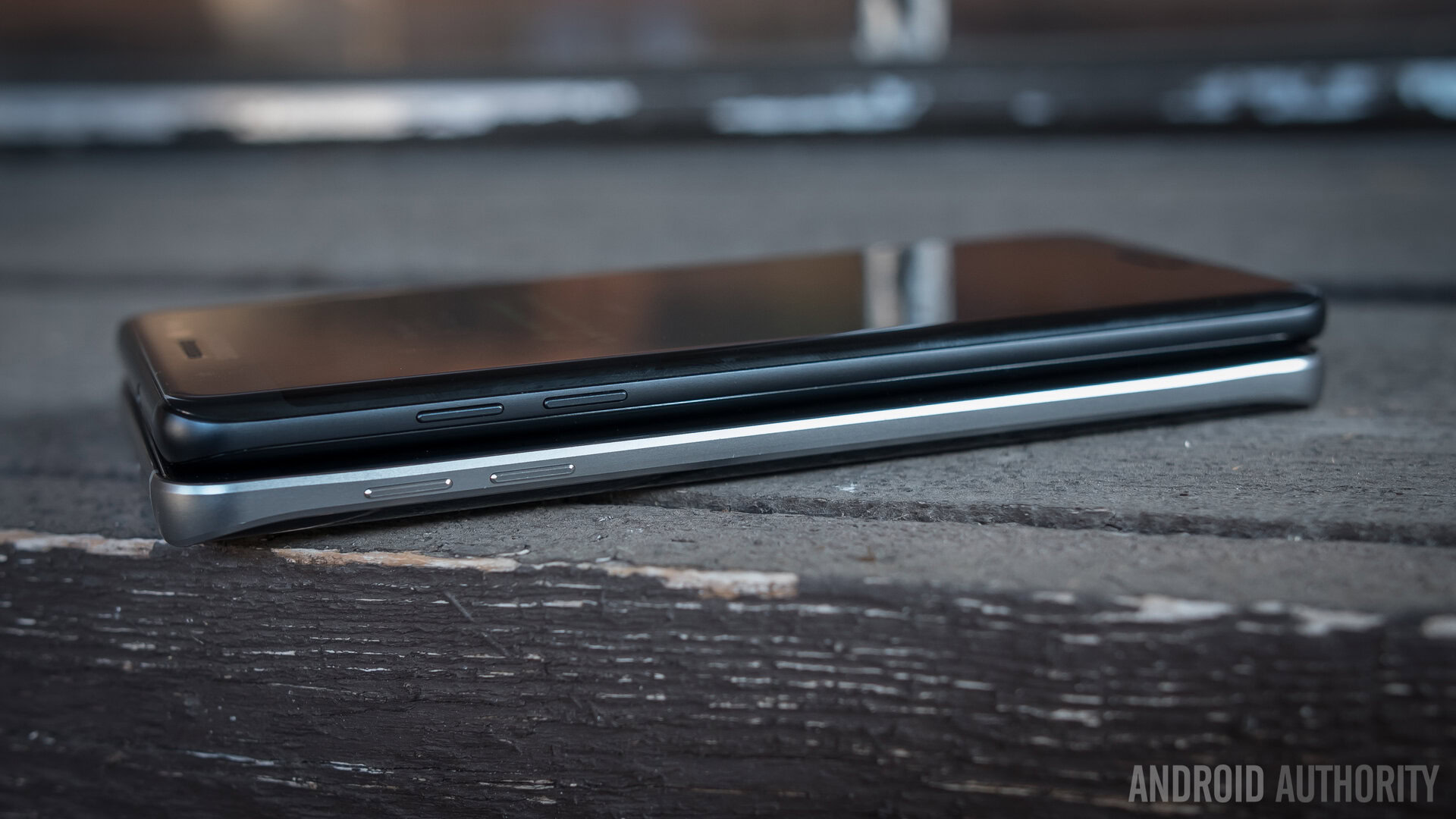
That said, the Galaxy Note 5 is still a large device, through and through. Since we have the Galaxy Note 7 in our hands now, it seems like a long time ago that such a large phone with a sharp metal frame was the norm. While the Galaxy Note 5 feels a little larger than the two, both have the same large canvas that plenty of users clamor for.
Now, that curve on the back of the Galaxy Note 5 makes even more sense , because it has been married to the front curve, with its successor. There’s no getting around it, this is the next baseline going forward. The edge is the norm for the Galaxy Note 7, not an extra version that will be built alongside what used to be the existing flagship. It’s a feature, not a novelty, and Samsung wants that to be official.
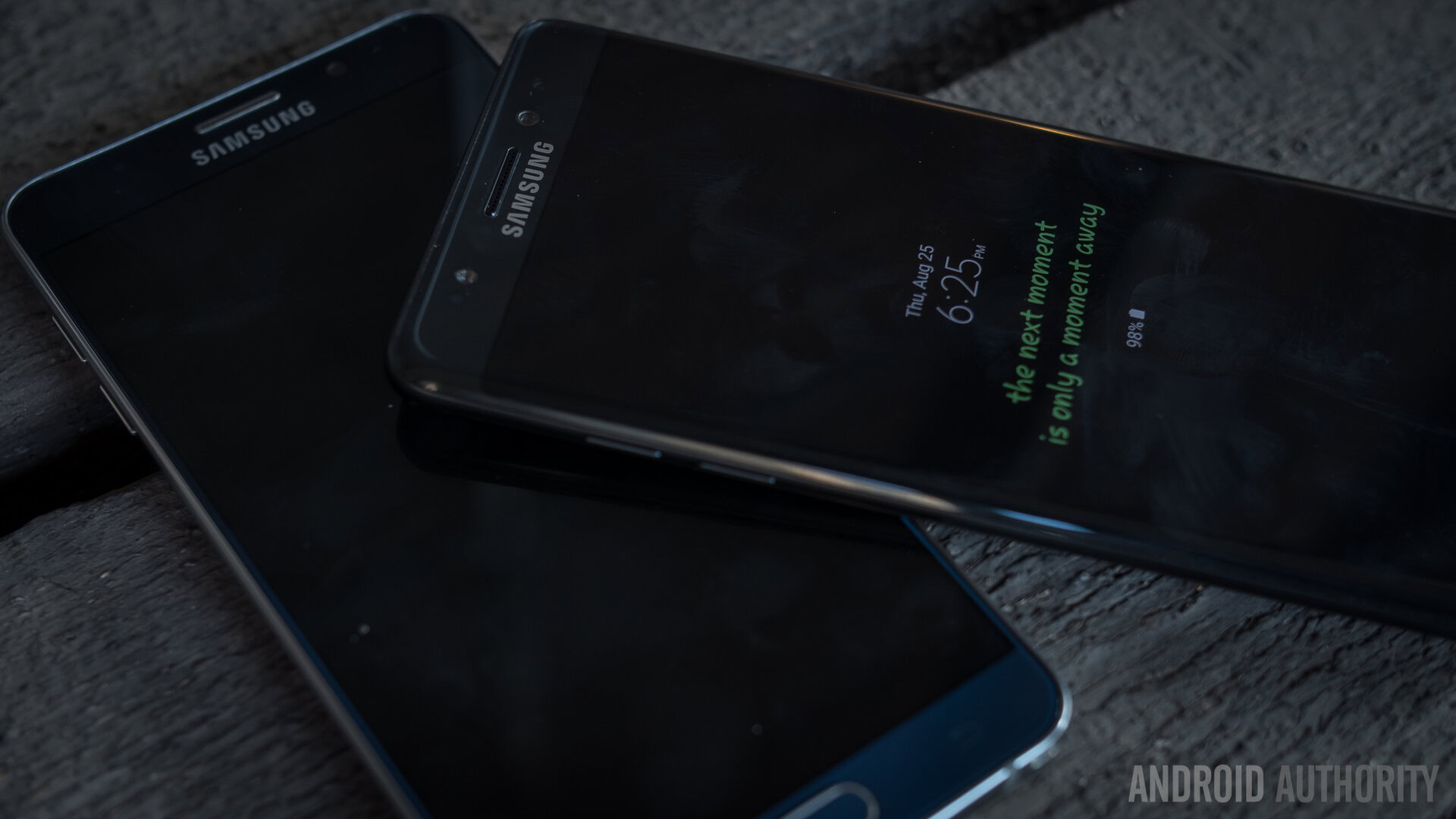
Samsung continues to provide the familiar aspects, including the home tactile button, button layout, and even the heart rate sensor, with the S Pen nestled to the bottom right portion of the phone, and now, the curved display is a part of that lexicon.
In the Galaxy Note 7, Samsung threw everything at their flagship device and the result is a phone that does continue the path that the Galaxy S7 Edge paved, but surpasses it. Unlike its predecessor, the Galaxy Note 7 can stand alone, and it does. Handling is better on the Note 7 in pretty much every way, and seeing and holding both phones together plainly shows the evolution.
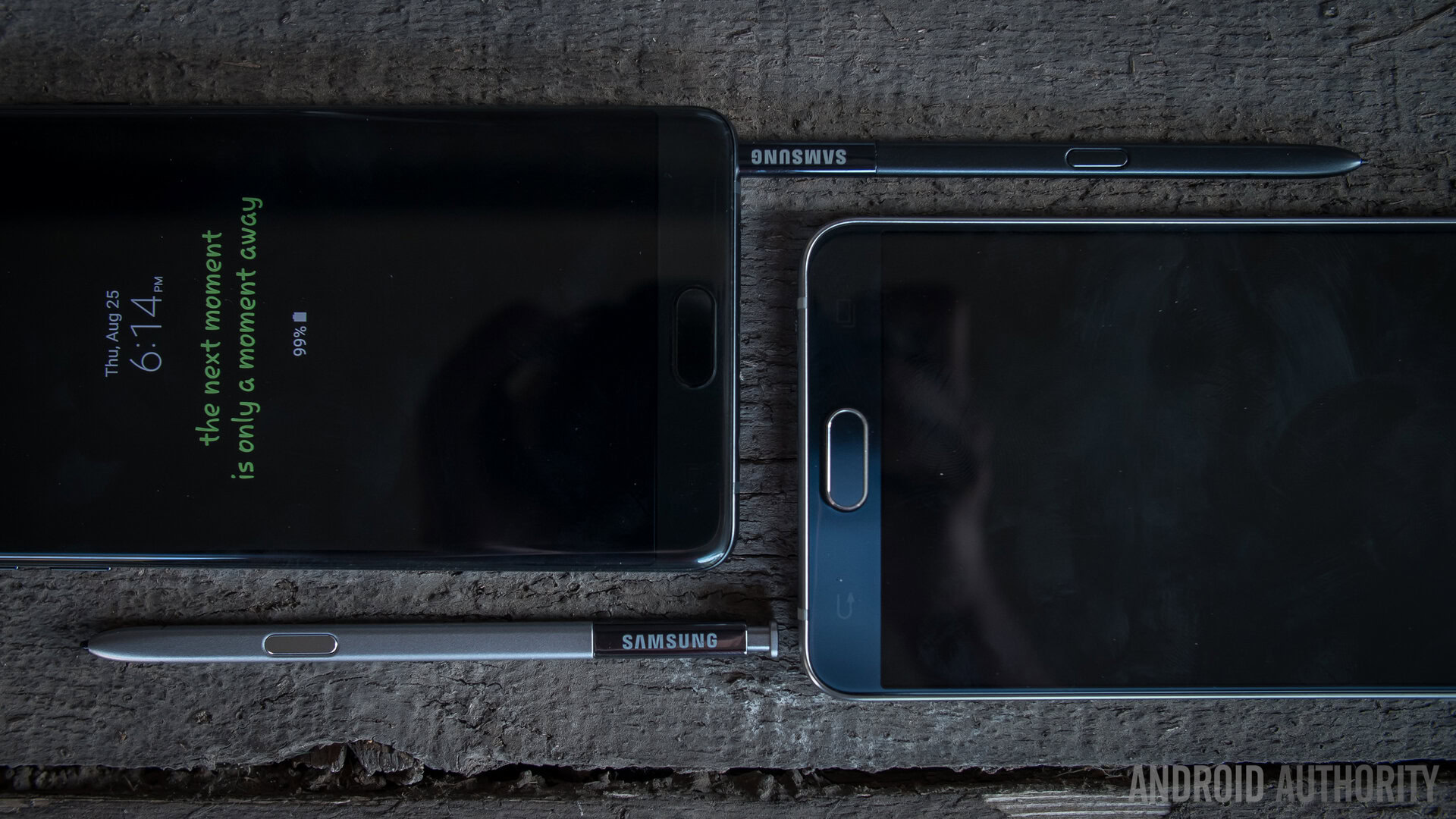
Some key issues were also addressed in the new Galaxy Note, most importantly, the S Pen going in backwards and breaking. This time around, the Pen won’t even go into the slot backwards more than just a little bit. If you aren’t careless with the S Pen, this probably won’t be a big problem anyway, but Samsung did well to address one of the few issues that actually got a lot of press.
Display
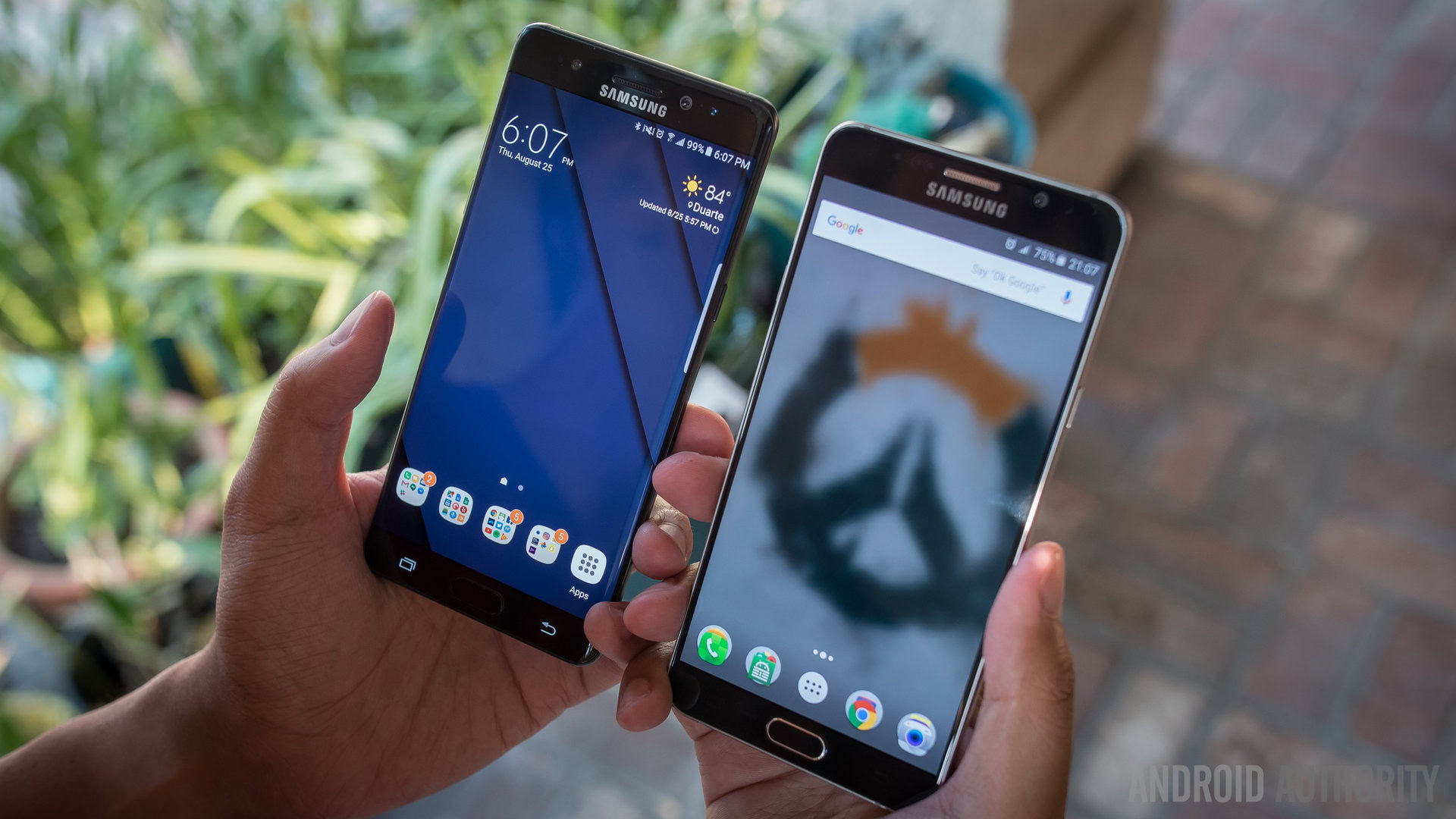
The screen of the Galaxy Note 5 is still one of the better ones out there, featuring a Quad HD resolution, and sporting the Screen Off Memo that proved to be a useful, quick tool for jotting down notes or small pieces of information. That returns in the Galaxy Note 7, which has the same Super AMOLED display with the same specs, but sports a couple of enhanced features.
Basically, the Screen Off Memo returns again, but can be pinned to the new feature, the Always On Display. Coming straight from the Galaxy S7 line, the AOD can show a clock, some text, an image, or a calendar, so there is always information available even in standby.
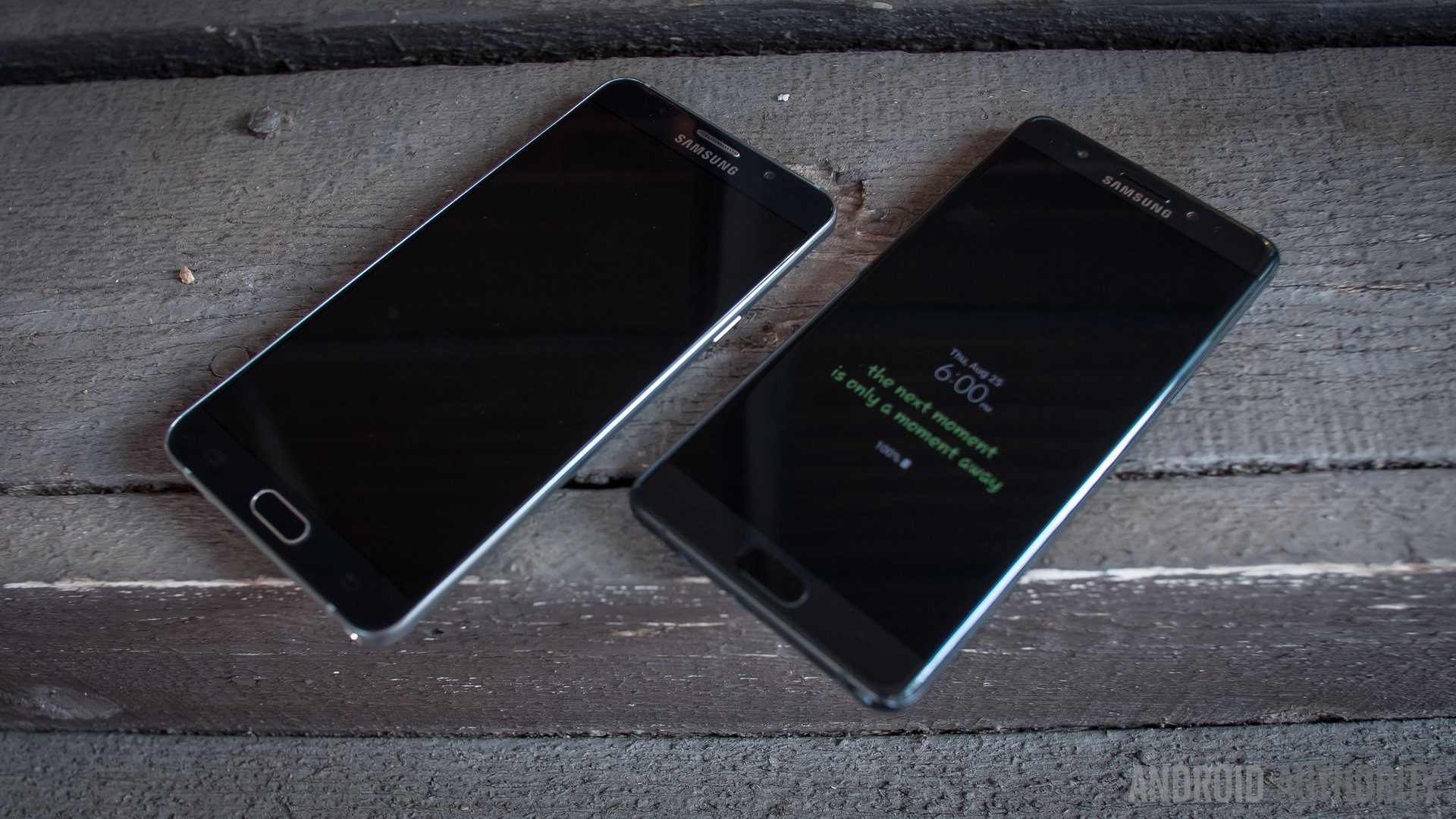
Of course, there is also the new Edge UX, which comes from the S7 Edge and provides no new features. Empirically, this is one of the new features that the Galaxy Note 5 simply doesn’t boast, making the Galaxy Note 7 the easier device to recommend overall.
Performance
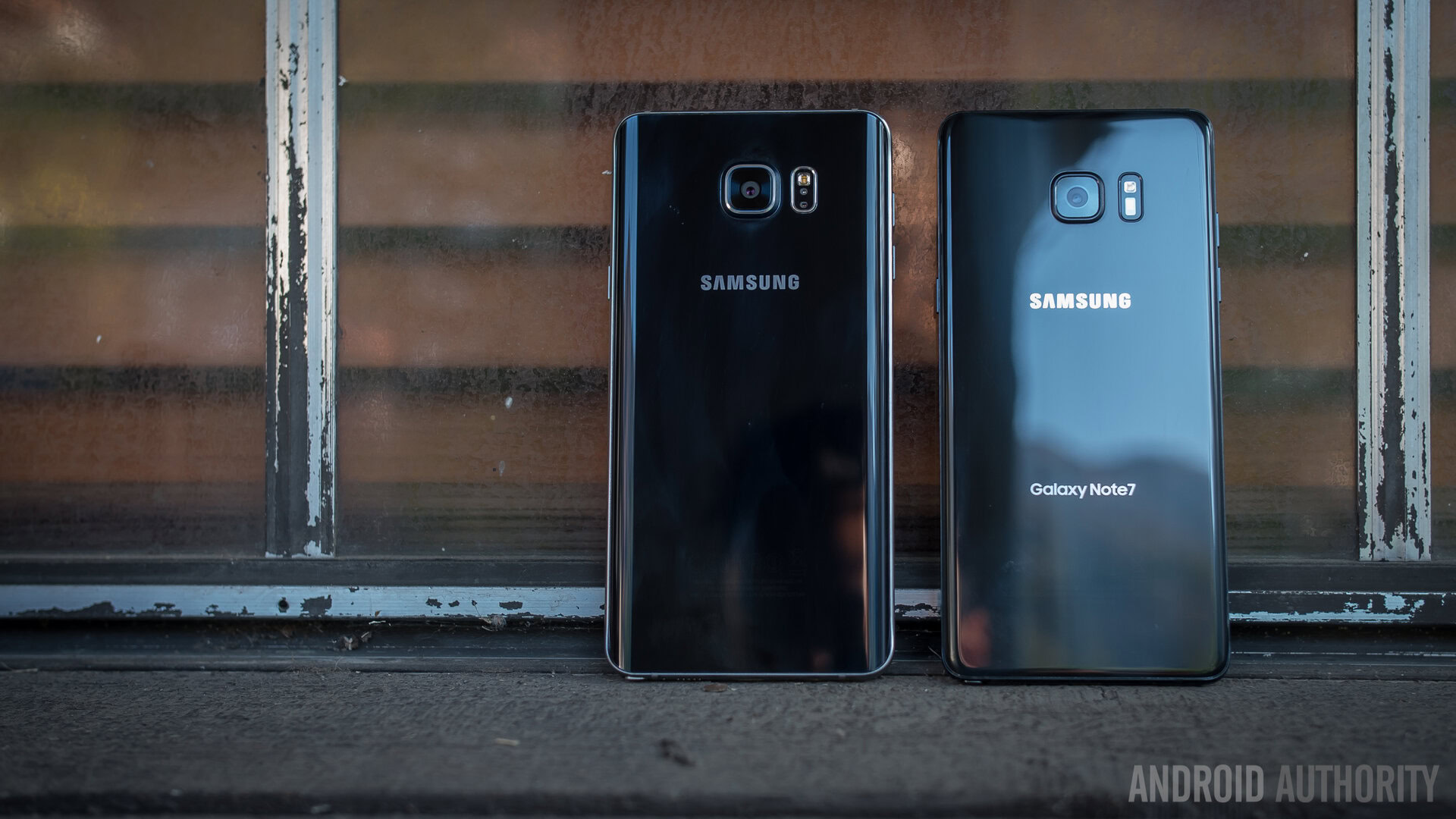
Performance on the Galaxy Note 5 continues to hold up, but that brings up an interesting aspect of this comparison, and when revisiting the old device, which came out at a time when Samsung was sticking to its own guns.
The Exynos 7420 is a more than capable processing package, enough to power all typical tasks of today’s smartphone user. We’ve even had a good time with Pokemon GO on the Galaxy Note 5, even it doesn’t last too long because of its smaller battery.
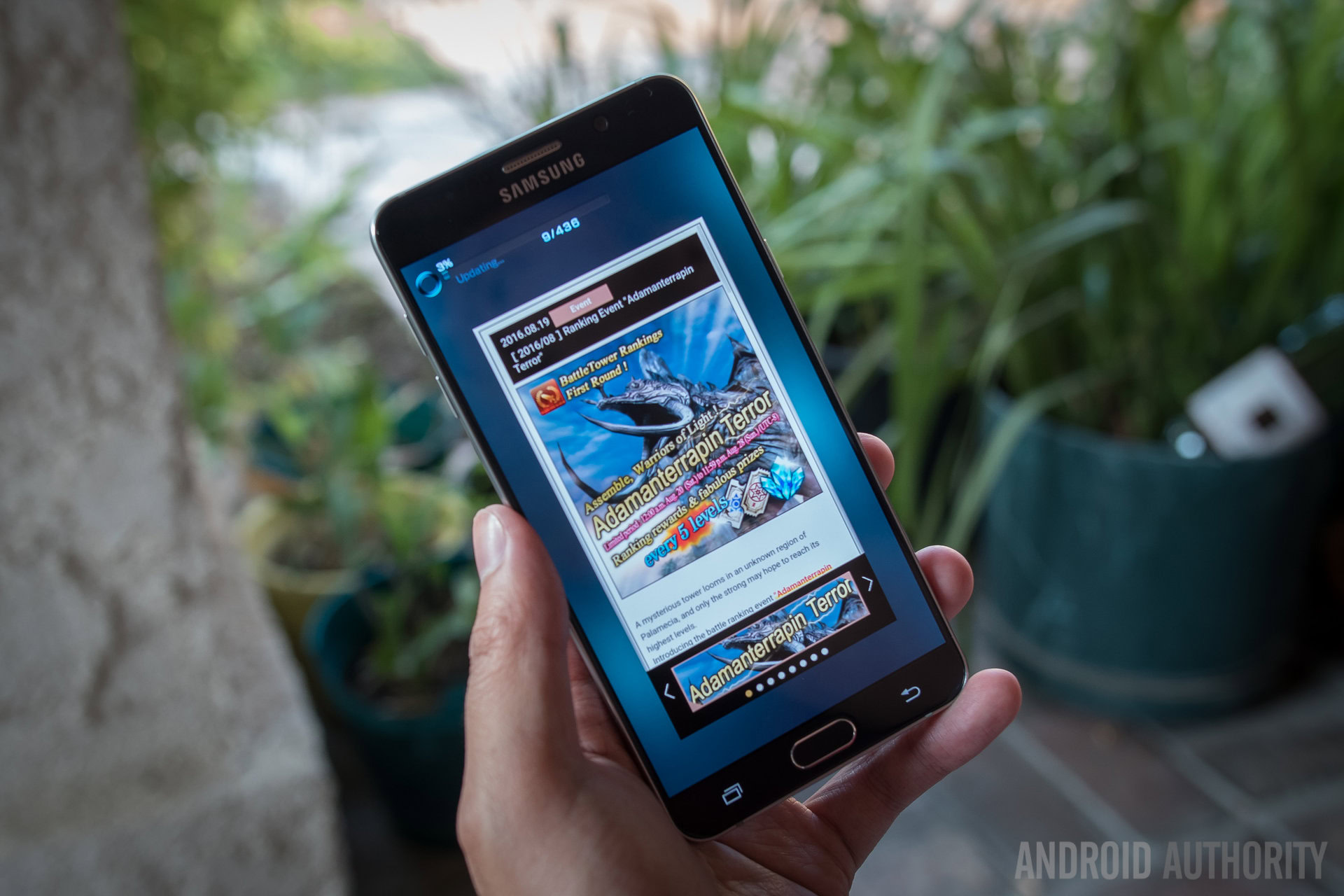
With the Galaxy Note 7, the Exynos is kept to markets outside of the US, while the Qualcomm Snapdragon 820 reigns in the West. That doesn’t pose a problem for performance though, because both do a great job with keeping the phone speedy.
Where we found a little bit of an issue was in the amount of RAM. Going over the standard 4GB is still a bit of a rarity in today’s smartphone world, but considering the exorbitant amount of features and capabilities in the Galaxy Note 7, it felt like having a bit more could have kept the phone from getting bogged down. Or, at the very least, it would keep the user from having to clean it up in the the Device Maintenance area from time to time.
Hardware
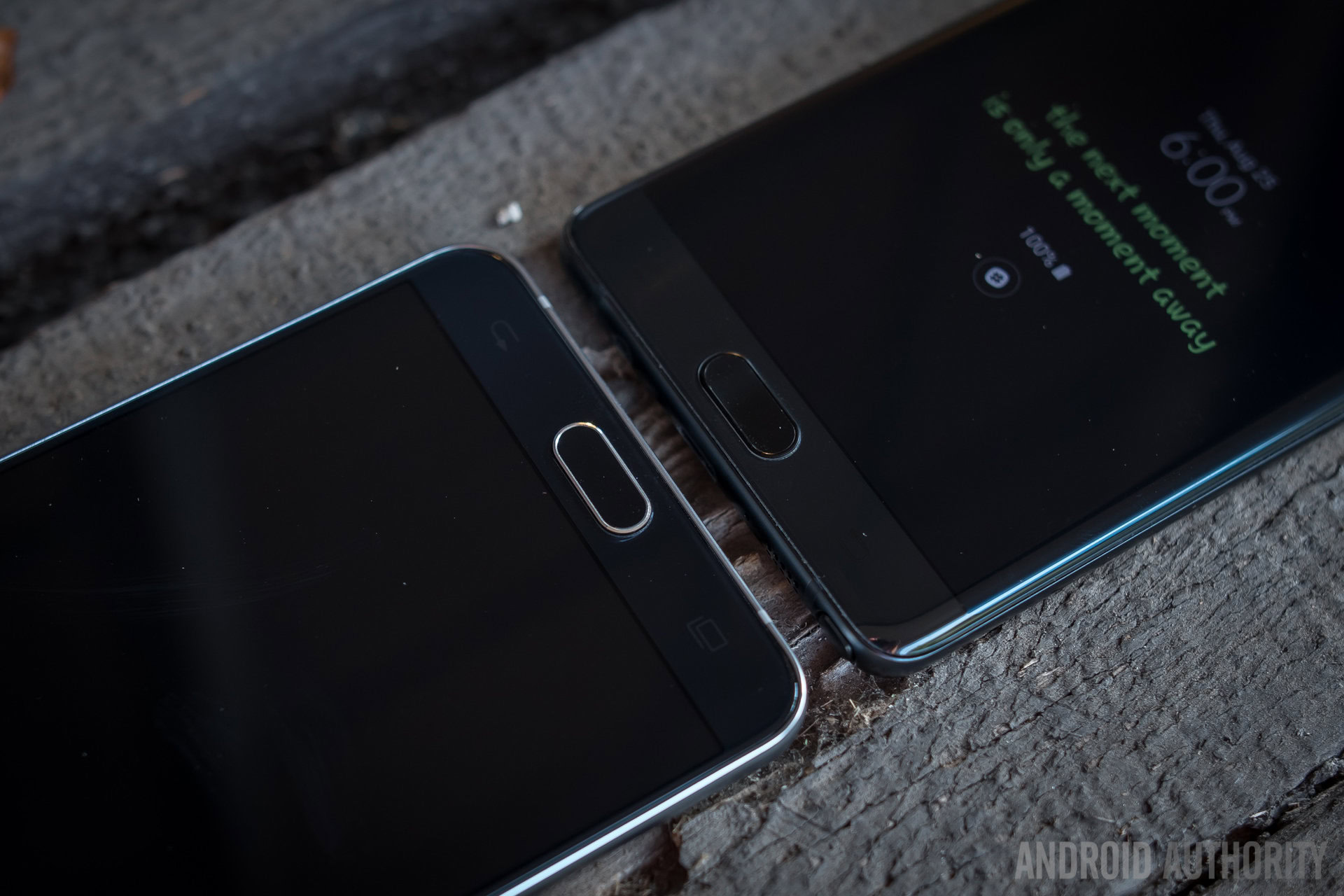
Part of what made the design change in the Galaxy Note 5 a bit harder to handle was the move away from what power users wanted. The move to glass and metal bodies made removable backings impossible, which cut off the access to the replaceable batteries and expandable storage. The lack of both hurt plenty of users, but expandable storage was more missed, when users had to settle for 32GB.
We have a plethora of users at Android Authority with different needs, and found that the power users who did a lot of gaming definitely had an issue with this, while the more moderate users were able to make it work for a long time until the pictures and videos took up all the space. No matter where users are on the spectrum, that amount of space was about as finite as it could get.
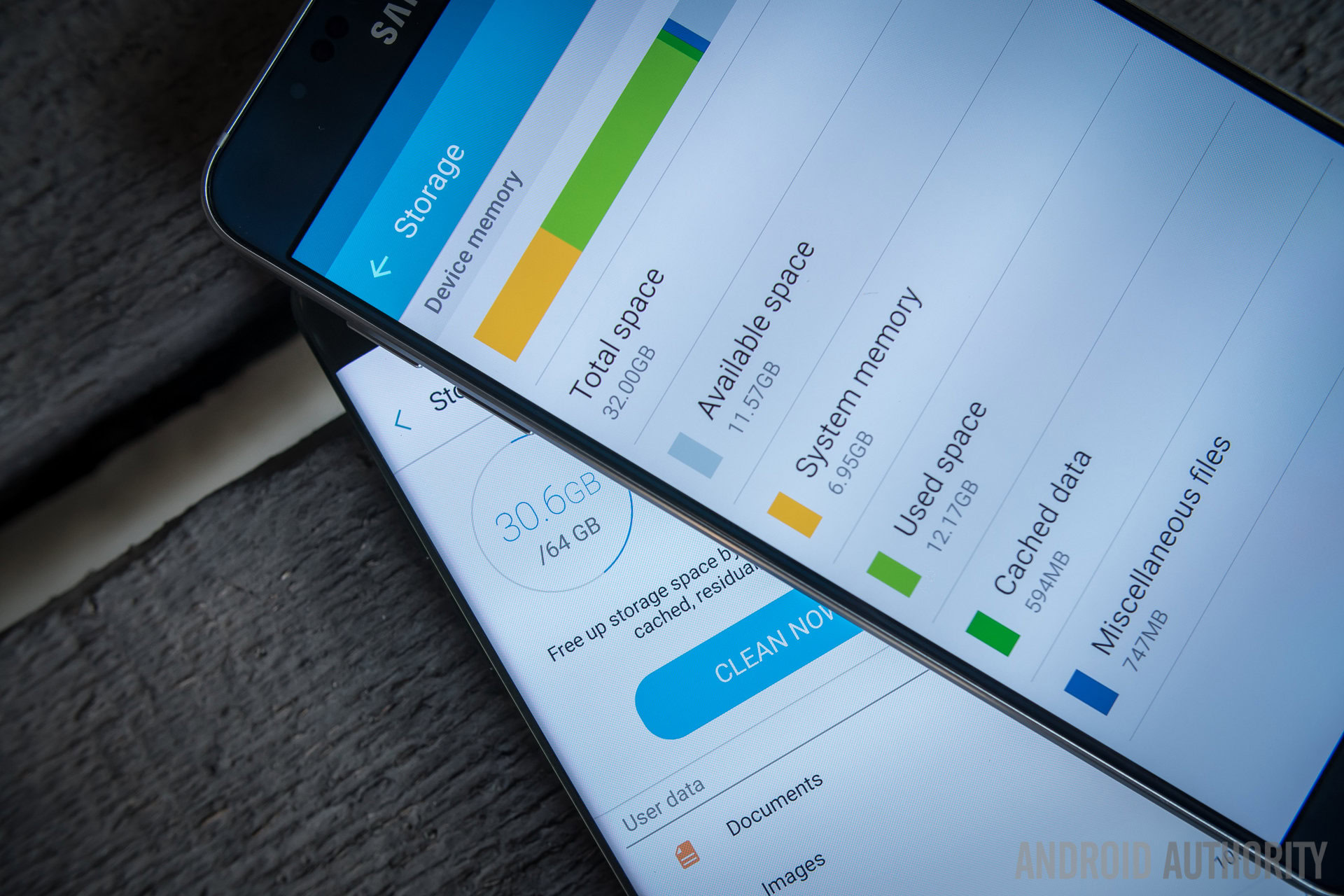
Which is why the Galaxy Note 7 continues to impress, mostly because it was able to address all of that in a couple simple moves, with 64GB of on-board storage, and the return of microSD card expansion. Not to mention Samsung put another foot forward by releasing a 256GB microSD card that will make all storage woes go away.
The speaker is still bottom mounted and just isn’t very good at overall sound and volume. The headphone experience gets enhanced with customizable EQ settings, though.
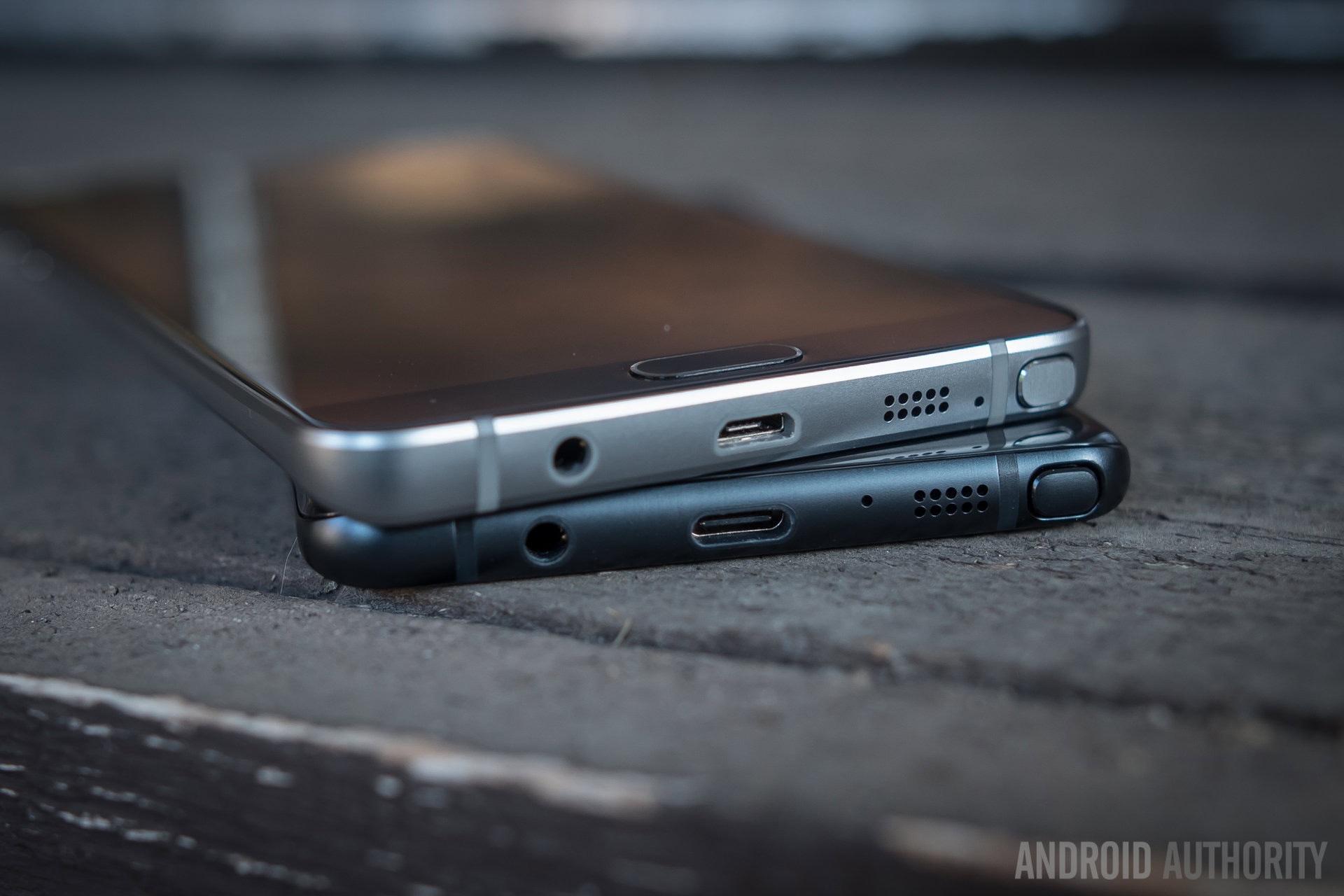
3,500 mAh brought the Galaxy Note 7 to a proper part of the power spectrum, where we’ve so far found a nice long amount of battery life, especially with moderate usage. Thankfully fast charging has really moved forward in efficiency as well, so the Note 7 benefits from even just half an hour of charging to get to 50% battery.
Wireless charging returns, too, so that getting power doesn’t have to be a tethered affair. If better battery life and faster charging are important, and we know it is, the Note 7 continues to iterate in the right ways.
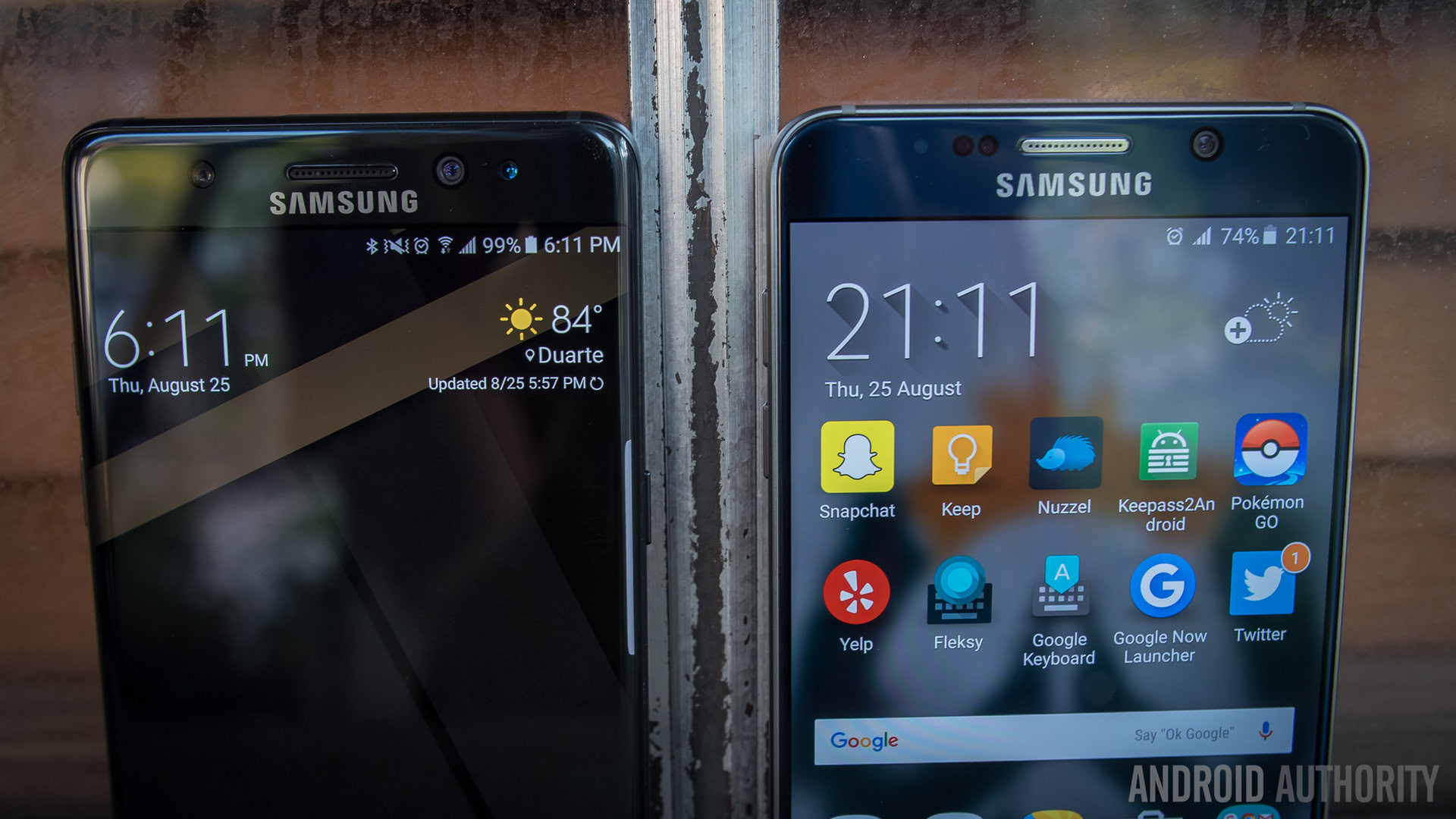
Which makes Samsung’s main addition a pretty big deal for the Note 7. The fingerprint reader on the Note 5 was already a good and fast biometric security feature, but the next step in such measures comes in the form of iris scanning.
A dedicated camera near the front facing camera does an infrared scan for a registered pair of eyes. Simply swipe up on the lock screen and gaze into the camera. For anyone that is looking for a little more security and ways of unlocking the phone, the Iris Scanner is definitely a “wow” feature, and can be used in conjunction with the fingerprint reader.
Camera
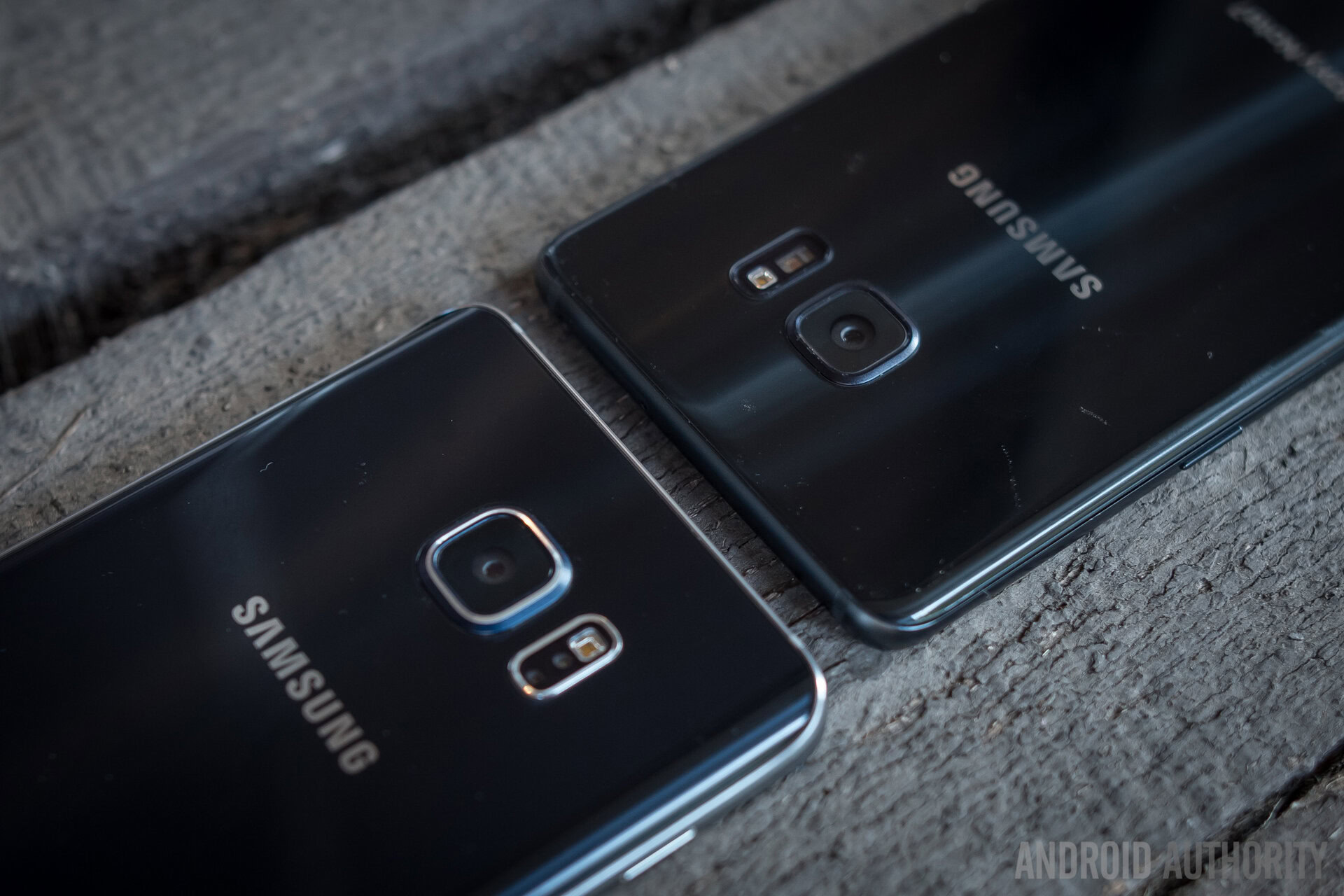
The cameras of the Galaxy Note 5 still have the specs of a high-end device, and continue to be reliable even a year after the phone was released. Compared to Galaxy the Note 7, it is just a few steps back in terms of sheer capabilities, but overall it continues to be a very good picture companion.
Sporting 16 MP shooter with a f/1.9 aperture, the Galaxy Note 5 doesn’t quite have the low light performance of the Note 7, that has 12 MP dual-pixel camera with a f/1.7 aperture. While the focus speed of the latter is definitely faster, it is one of the only advantages that can easily be experienced.
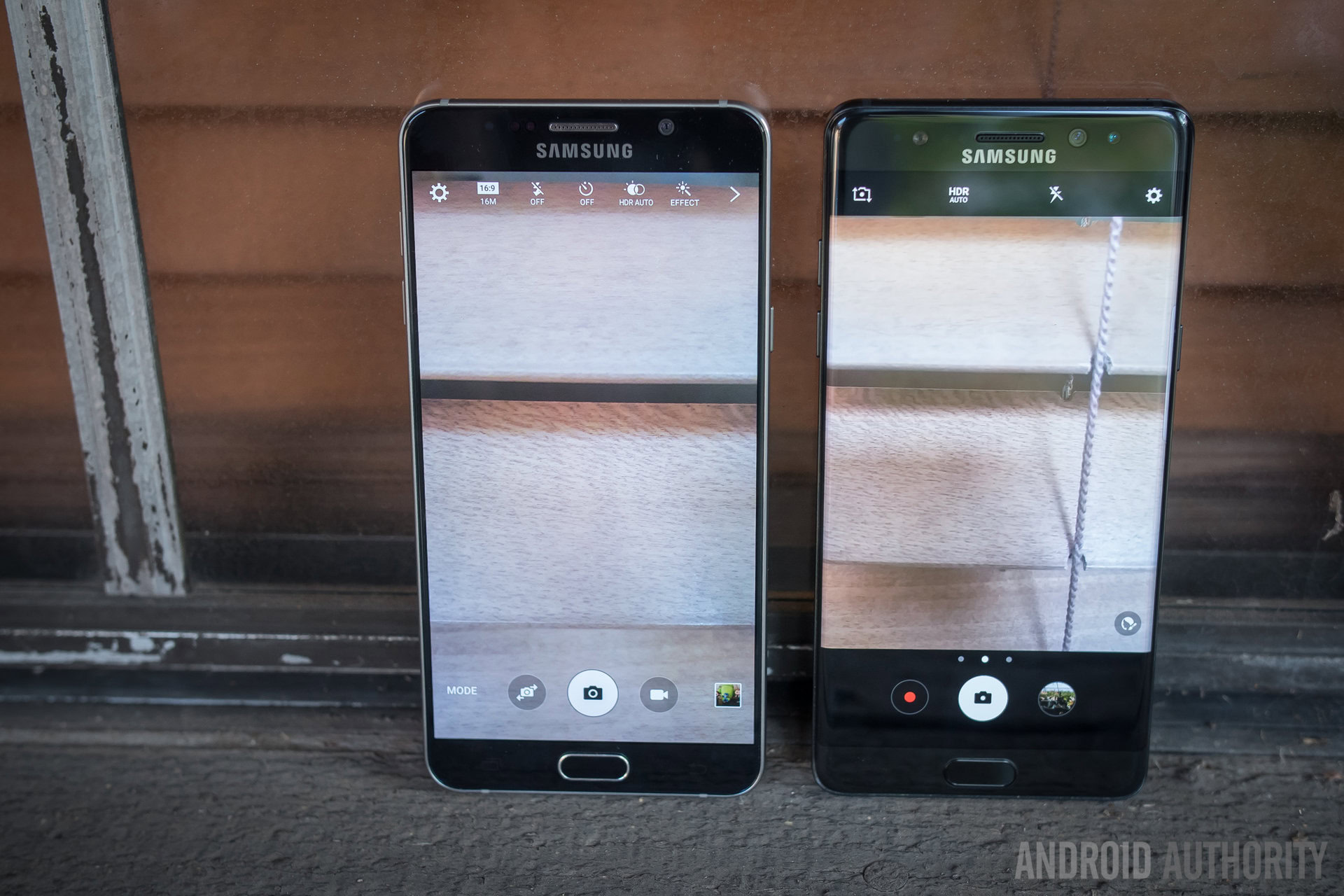
I used the Galaxy Note 5 in New York when we were getting to know the Note 7 for the first time. It proved to be an easy companion to have for all sorts of pictures and videos, including the occasional vlog or Instagram story.
Samsung Galaxy Note 5 camera samples
So, to that end, the pictures between these two aren’t too far off in quality. Structurally speaking, the lower aperture of the Note 7 means slightly better bokeh for softened backgrounds, and that is also true for the front-facing camera.
Samsung Galaxy Note 7 camera samples
Overall, the pictures and videos coming out of either phone show that Samsung has continued to provide some of the best camera experiences in the world of Android. While there are definitely some advantages to having the Note 7’s cameras, we don’t see there being much problem with the Note 5, given that video and picture quality hasn’t made any big steps or leaps since its inception.
Software
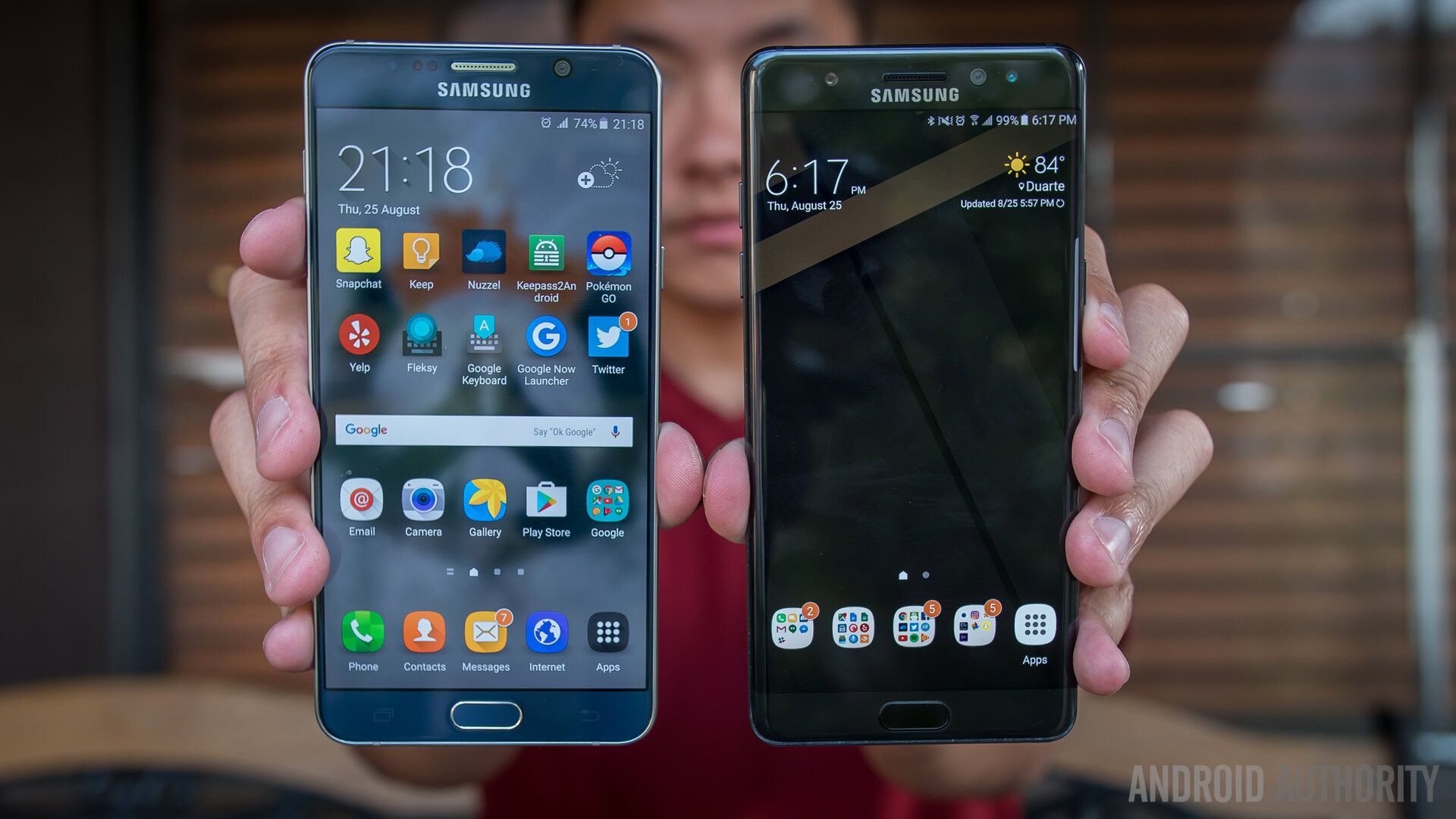
Finally, the software for both of these phones is still pretty similar, with the Galaxy Note 7 basically adding a few coats of polish over the existing Samsung UI. Touchwiz isn’t quite the name that they use for the software anymore though, and for good reason.
Especially with the Note 7, there has been some cleaning up in what used to be a bloated and very cartoonish interface. While some of those elements are still around, there is a noticeable unification to it all, that makes the Note 7 look a bit better on the inside.
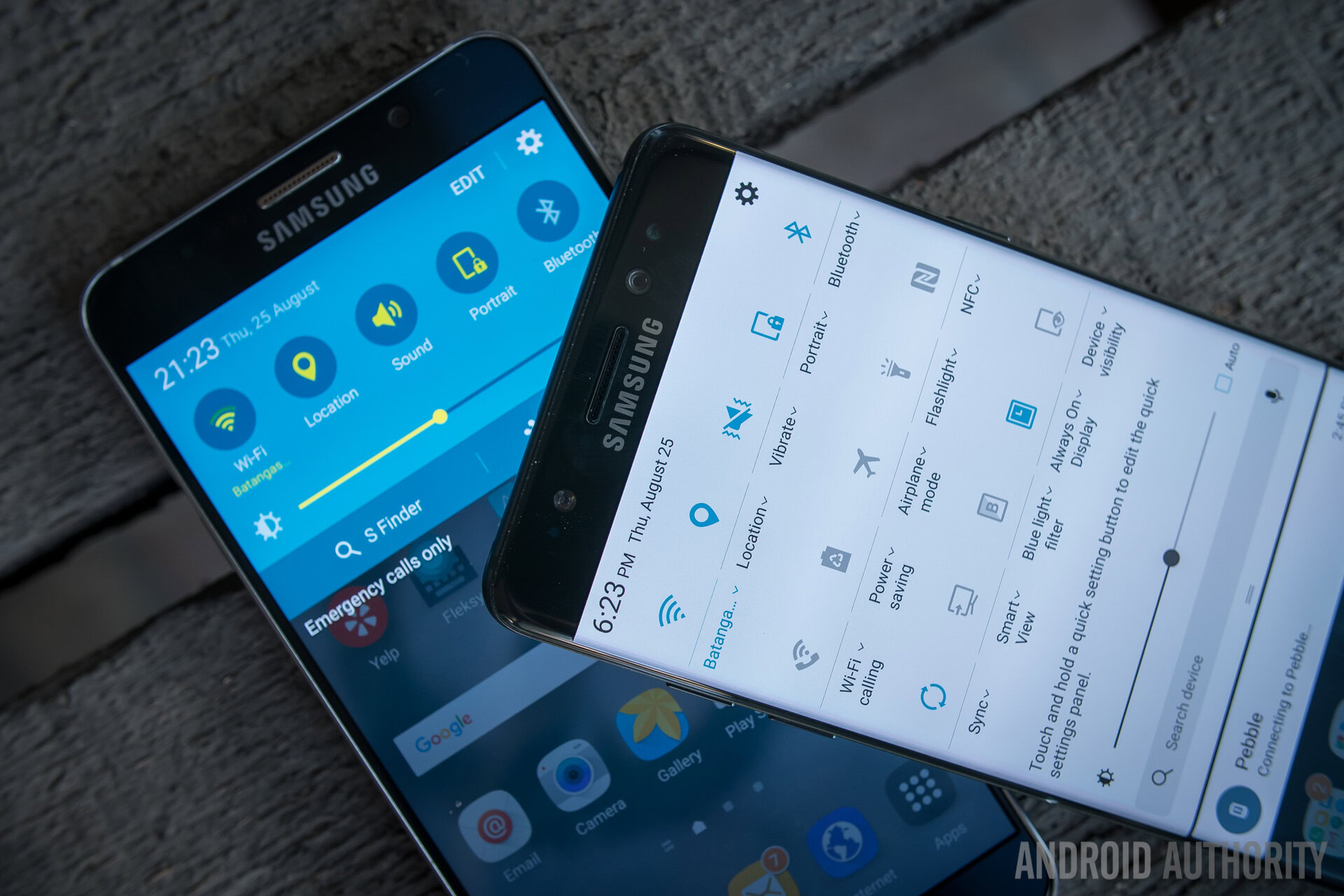
That said, these are still some of the most feature packed software packages available, and more so with the Galaxy S7, because of the addition of the Iris Scanner, the Edge UX, and the Always On Display. Some other additions include the the Blue Light Filter and the enhancements to the S Pen.
The S Pen can now translate words, magnify elements on the screen, and create GIFs. All of these features were delved into more in the full review of the Note 7, coming eventually to the conclusion that they do add to the overall S Pen experience, even if they are tools that are situationally useful.
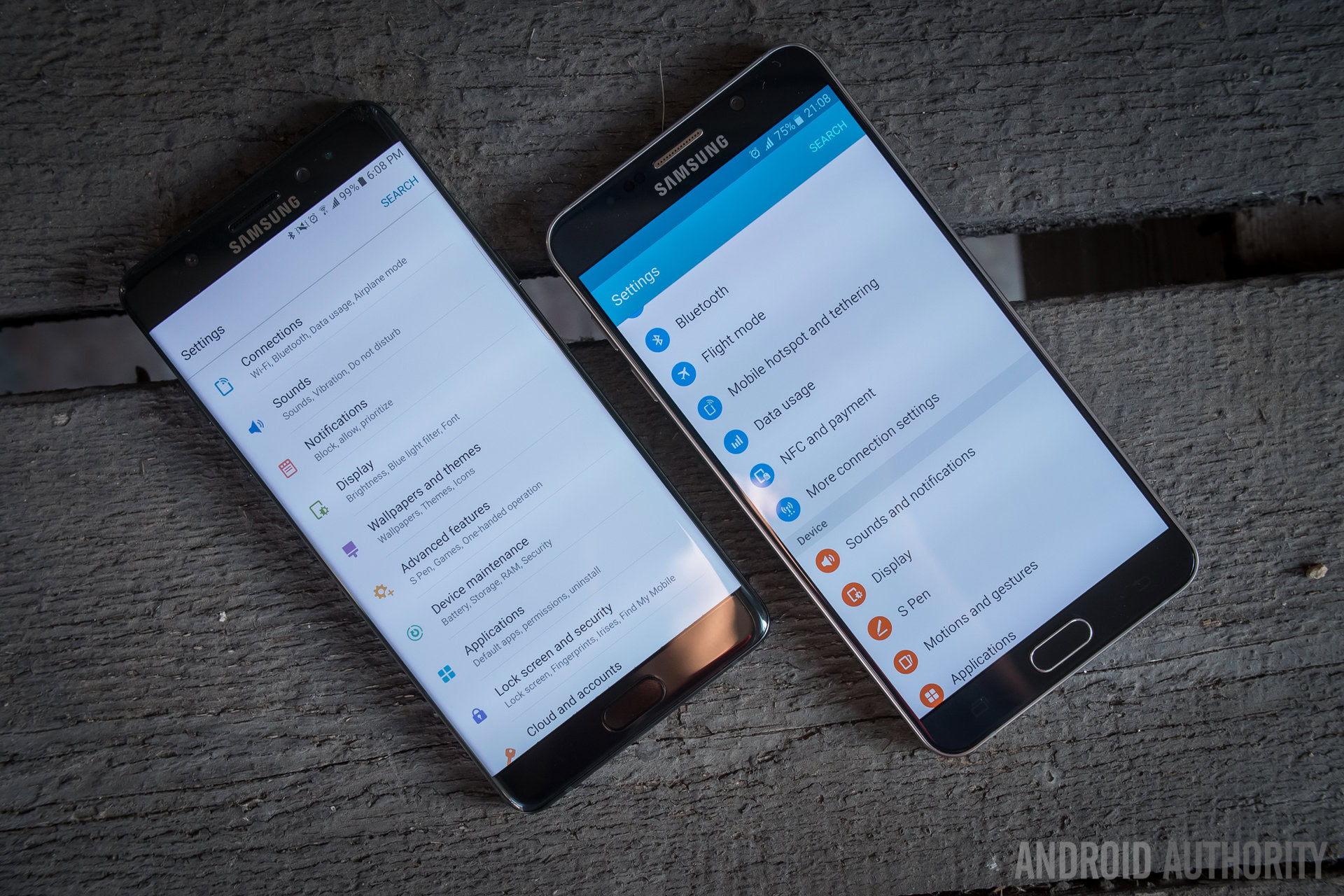
Strip that all away and the software experience is essentially that of the Note 5. Which makes this comparison a bit simple. If all that was added onto the Note 7 experience doesn’t really entice you to upgrade or even go further than the 5th version of the line, then the Note 5 can provide all of the elements that you may be used to already.
MultiWindow, Pop Up View, existing Screen Write and Notes capabilities, and even theming abilities are still all available and viable. It comes down to one simple question – are the additions in the Note 7 and the interface polish enough to put it over the top?
Specs comparison
| Samsung Galaxy Note 7 | Samsung Galaxy Note 5 | |
|---|---|---|
Display | Samsung Galaxy Note 7 5.7-inch Super AMOLED display Quad HD resolution, 518 ppi | Samsung Galaxy Note 5 5.7-inch Super AMOLED display Quad HD resolution, 534 ppi |
Processor | Samsung Galaxy Note 7 2.15 GHz quad-core Qualcomm Snapdragon 820 processor Adreno 530 GPU | Samsung Galaxy Note 5 2.1 GHz octa-core Samsung Exynos 7420 processor Mali-T760MP8 GPU |
RAM | Samsung Galaxy Note 7 4 GB | Samsung Galaxy Note 5 4 GB |
Storage | Samsung Galaxy Note 7 32/64 GB expandable via microSD card up to 256 GB | Samsung Galaxy Note 5 32/64/128 GB not expandable |
Camera | Samsung Galaxy Note 7 12 MP rear camera, f/1.7 aperture, OIS, LED flash 5 MP front-facing camera with wide angle lens | Samsung Galaxy Note 5 16 MP rear camera, f/1.9 aperture, OIS, LED flash 5 MP front-facing camera with wide angle lens |
Connectivity | Samsung Galaxy Note 7 Wi-Fi 802.11 a/b/g/n/ac Bluetooth 4.2 NFC GPS + GLONASS USB Type-C (USB 3.1) | Samsung Galaxy Note 5 Wi-Fi 802.11 a/b/g/n/ac Bluetooth 4.2 NFC GPS + GLONASS microUSB 2.0 |
Battery | Samsung Galaxy Note 7 3,500 mAh | Samsung Galaxy Note 5 3,000 mAh |
Software | Samsung Galaxy Note 7 Android 6.0 Marshmallow | Samsung Galaxy Note 5 Android 6.0 Marshmallow |
Dimensions | Samsung Galaxy Note 7 153.5 x 73.9 x 7.9 mm 169 grams | Samsung Galaxy Note 5 153.2 x 76.1 x 7.6 mm 171 grams |
Gallery
Final thoughts
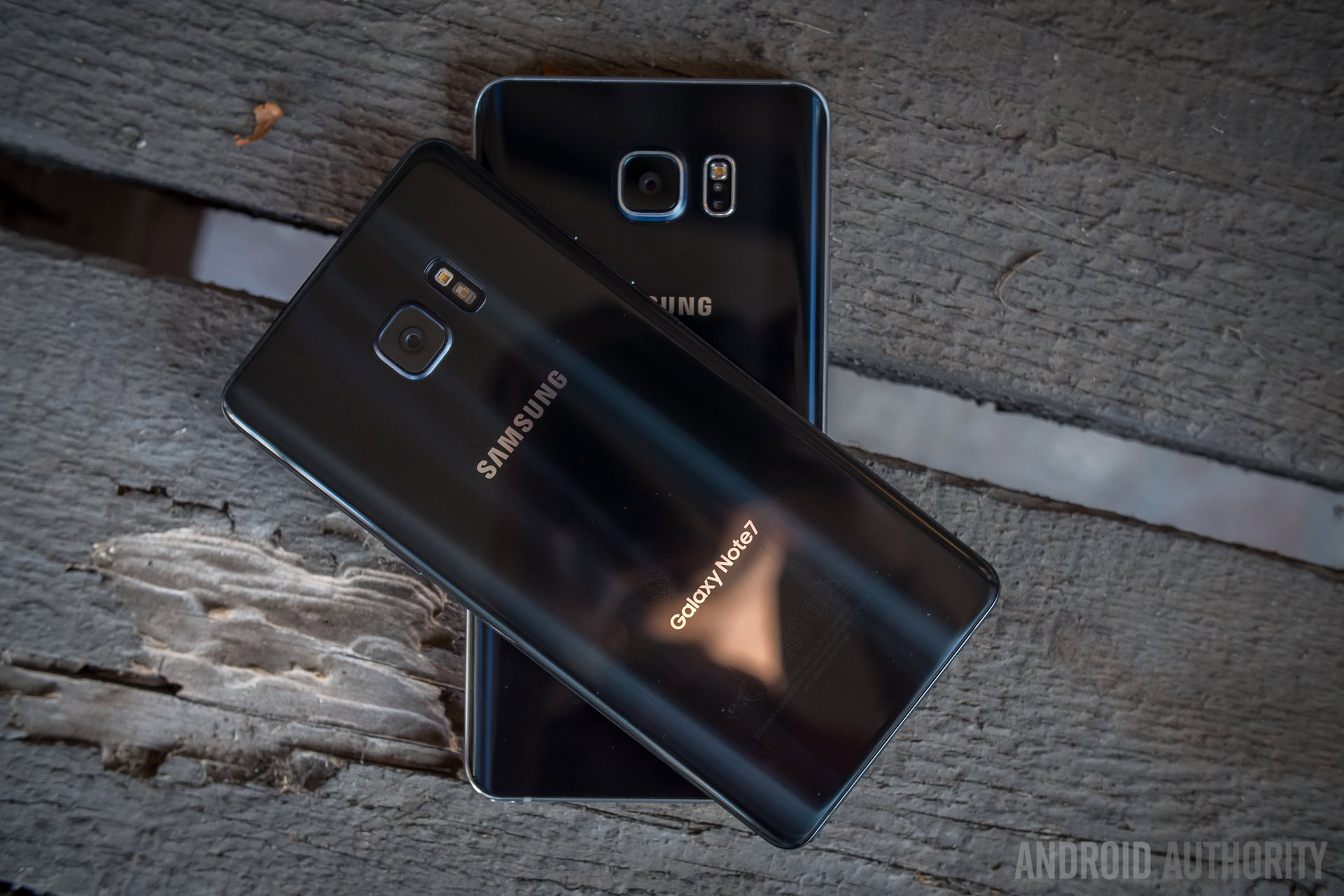
So there you have it for this in-depth look at the Samsung Galaxy Note 7 vs Galaxy Note 5! A lot of this comparison shows how the Note 7 is the definitely the phone to beat. Better on-board and expandable storage, a bigger battery, and the new features make the Note line feel fresh again. Or at the very least, it makes us feel the way the Note 5 failed to when it was first released.
However, that doesn’t mean that the Galaxy Note 5 isn’t a good value in and of itself. Even without the leaps forward, it was still a top 2015 device, and some believed it could only be surpassed by the next Galaxy S and, in this case, the new Galaxy Note.
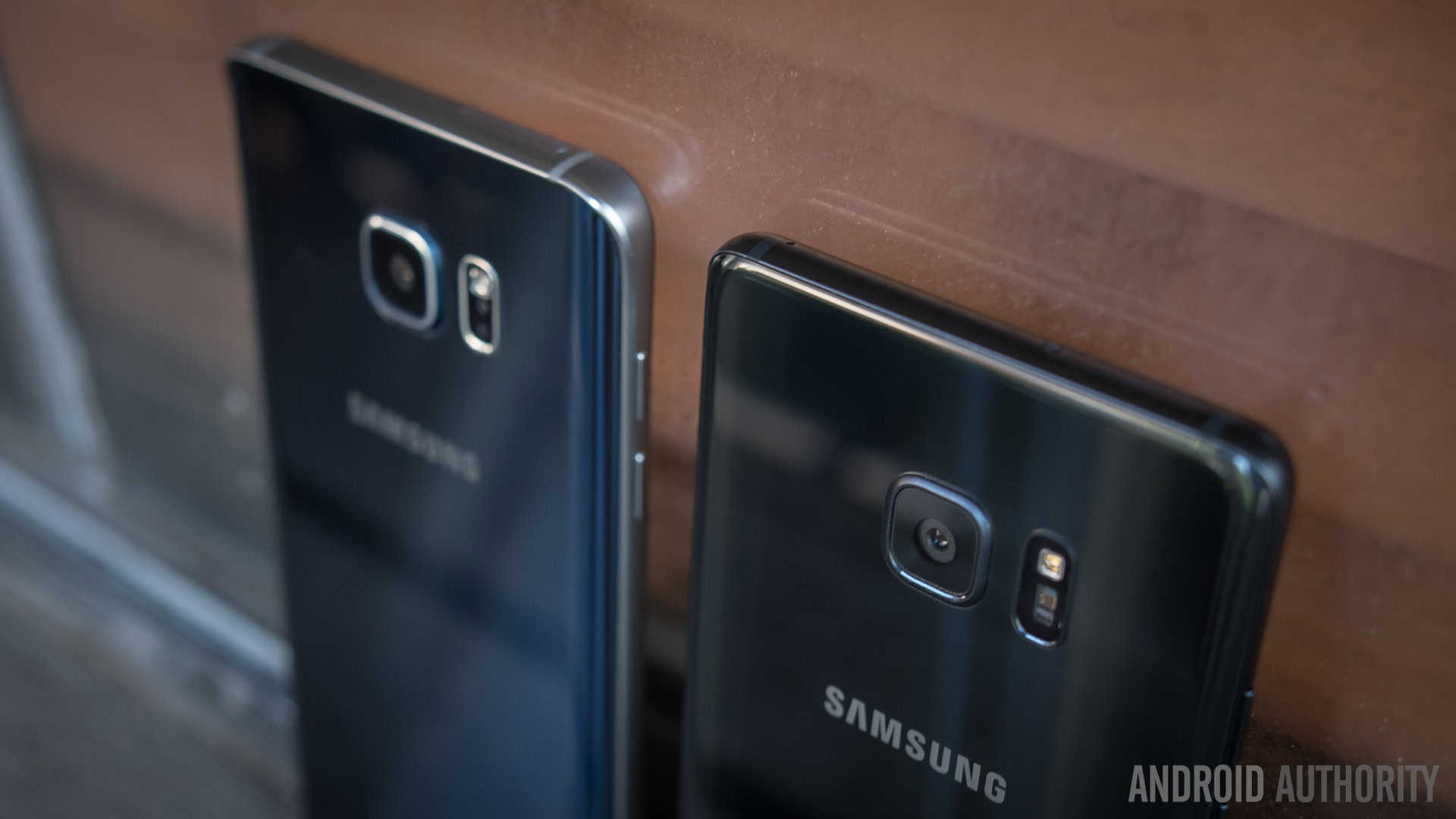
Without some of the many features that make up the incredibly stacked package of the Note 7, the Note 5 continues to be a good and reliable daily driver. If you need the best, the latest, or the capabilities that appeal to the power user, then the Note 7 might be the phone that you’ve been waiting for.
That said, users still using the Galaxy Note 5 have a lot to be happy about. If you have, however, been holding onto an even older phone and need to save a little bit of money, the tradeoffs between these two devices, while significant, are not immediately dealbreaking. The Galaxy Note 5 still has ability to be a viable choice in today’s smartphone climate, which makes it a value that users should definitely consider if these are the two phones in contention.